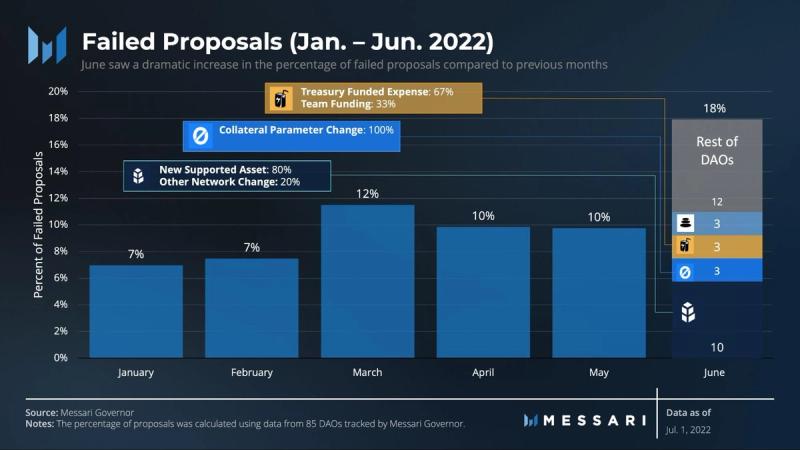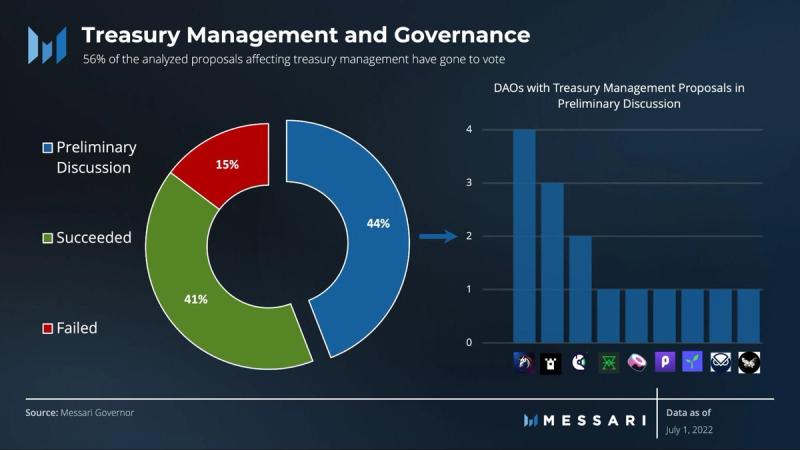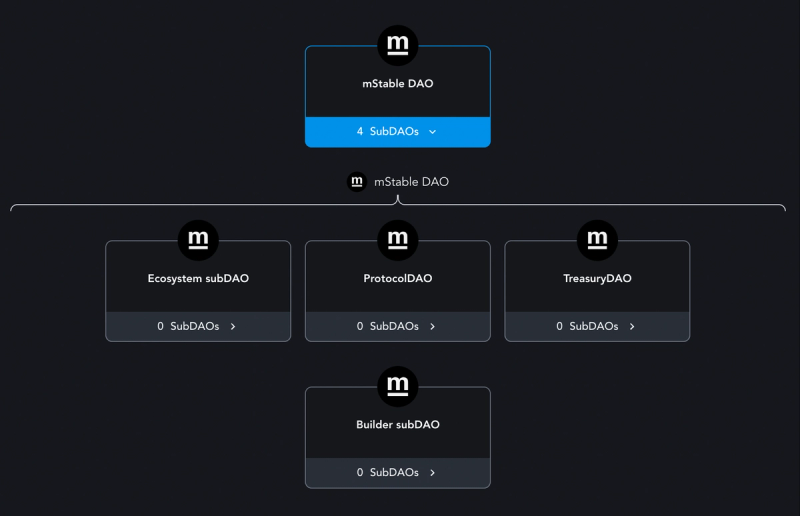In Governor Insight #1, we explored the DAO ecosystem using data from Messari Governor. Our analysis of DAO proposal activities revealed a high frequency of proposals towards expenditures. With the start of Q3 2022 and the bear market situation, attention has been on DAO treasuries and spending. This report analyzes the frequency of failed proposals in the past months as well as treasury management and diversification proposals.
Proposal Tracker
A Spike in Failed Proposals

June 2022 saw a notable increase in the percentage of failed proposals on Messari Governor. The rise in failed proposals came as markets suffered dramatic losses, demonstrating greater fear in how DAOs allocate funds. The rise also resulted from the asset whitelisting processes of Balancer and Bancor, which both recently revamped their tokenomics and protocol frameworks with veBAL and Bancor V3. Failed proposals from the two decentralized exchanges accounted for 42% of June’s failed proposals. A quarter of the failed proposals were asset whitelistings directly from Bancor’s transition to V3 which had its own issues with the impermanent loss protection mechanism and was forced to pause deposits on June 19. Assets not accepted by the community included ICHI, sUSD, sBTC, BUSD, and BAND.
Likewise, the whitelisting of veBal gauges has become a contentious issue. The passage of BIP 4 required all approved gauge pools to set ownership to Balancer governance after the Cream/WETH pool attempted to game the system by mining BAL rewards. As Balancer continues to tune its gauge mechanism, multiple proposals for veBAL gauge whitelisting failed to receive community support, including BIP 7, BIP 8, and BIP 10.
Outside of failed whitelisting proposals, 39% of the failed proposals were treasury expenses. The market downturn has affected the operations of many DAOs, including Shapeshift DAO. Two clear examples of negative sentiment towards extra spending arose with SCP 82 and SCP 88. Community members warned against excessive spending at the beginning of a prolonged bear market. Even more dramatic were the various Shapeshift workstreams that received cuts including termination of the Support Workstream and Globalization Workstream. While an increase in failed governance proposals sounds negative, communities are actively weeding out risky asset listings and vetting spending proposals that don’t meet community standards.
Observing DAO Treasury Management and Diversification Proposals
The market downturn inspired DAOs to adjust their balance sheets to weather the variable market conditions. Many DAOs have leveraged their native token supply to diversify their treasury holdings, boost liquidity, earn yield, and extend their operational runway. Over half of the treasury management proposals that Messari reviewed pertained to either acquiring stablecoins or generating a yield on them. When it comes to treasury diversification, an underappreciated challenge for bootstrapping treasury initiatives is navigating treasury management through governance: 44% of current treasury management proposals haven’t proceeded past the preliminary discussion phase.

Of the treasury management proposals our team observed, Rook Protocol DAO featured the highest number of proposals related to DAO treasury diversification. And while some of them are still in the preliminary discussion phase, Rook also successfully adopted a handful of them, including:
- Treasury Utilization Opportunity with mStable Save (KIP 22): This proposal approved $500,000 of treasury funds to be deposited in mStable’s Save product each quarter for an estimated yield of 11%,
- Strategic Use of ETH Yield Generation (KIP 24): This proposal approved 75% of the Rook Protocol DAO treasury-held ETH to be deposited into a diversified portfolio of ETH staking protocols (Stakewise, Rocket Pool, and Lido).
Rook has a comparatively active treasury strategy and has deployed treasury funds for various purposes in tools such as Maple Finance, Convex, Votium, and mStable.
However, not all DAOs have been able to adopt treasury governance proposals as quickly as Rook DAO. Gitcoin DAO, for example, has been working with Llama since January 2022 to diversify Gitcoin’s annual operating expenses to approximately $15 million in stablecoins. While Gitcoin announced a Treasury Diversification Working Group on January 15, 2022, the group is just now voting on a proposal to initiate the sale of GTC for USDC to support workstream funding needs. The proposal requests an immediate sale of $3 million USDC and outlines a plan to attract strategic partners to acquire the remaining $12 million USDC.
Since the formation of the working group, the GTC token price has fallen 59% (from $6.93 to $2.82). The situation presents a harsh reality: a diversification plan was drafted but not executed quickly enough to have its desired effect. The rising bear market highlights new challenges for DAOs with ample native token supplies. Gitcoin and like-minded DAOs who failed to diversify when markets were hot have struggled to navigate OTC token sales in a slack economy. The challenges include off-loading tokens in an environment with potentially little native liquidity depth and a cooling climate for OTC buyers.
Although some DAOs may be kicking themselves for not acting faster, other DAOs may do the same for working too quickly. In May 2022, Ribbon Finance DAO approved Ribbon Bond Issuance (RGP 17), a proposal to raise a debt-funding round of $3 million USDC of convertible bonds (backed by $15 million in RBN) using Porter Finance. The raised USDC was proposed to function as working capital for the DAO. While the bond would have a 7% APR, 5% was subsidized by a redeemable IOU for Porter’s unreleased governance token (PTR).
The original proposal had little engagement. One community member, Chandler, proposed Success or Range Tokens as an alternative raising strategy. Dan Elitzer, co-founder of Nascent and investor in both Ribbon and Porter Finance, offered support as the forum’s only engagement. The proposal passed, yet once Ribbon raised the cash, the DAO could not agree to deploy the $3 million USDC. Allocation of Bond Issuance Funds (RGP 20) proposed to loan the USDC to the Orthogonal Trading Pool via Maple Finance and use the funds to bootstrap the Ribbon Fuse Pool, but it failed to pass. To make matters worse, Porter Finance officially shut down its bond issuance program on July 4, 2022.
Governor Recap
Notable Discussions:
- Community DAO Funding: This proposal aims to organize a community funding round for Gearbox DAO. This is a supplemental funding round to Strategic DAO Funding (GIP 10). After an Expression of Interest (EOI) submission period for the community funding round, $860,000 to $886,000 has been allocated to qualified funding commitments. Details regarding the mechanisms for collecting qualified funding commitments and GEAR distribution in accordance with cliff and vesting terms will be decided in the near future.
- Deploy Permissionless Olympus Pro as Bond Protocol: This proposal aims to rebrand and deploy the Permissionless Olympus Pro contracts as an independent entity, Bond Protocol. Bond Protocol will remain tightly aligned with OlympusDAO and include the same Olympus Pro contributing team. The first two bond types supported will be fixed-term bonds tokenized as ERC-1155 NFTs and fixed-expiry bonds tokenized as ERC-20.
- Conversion to a Mayor-Council Structure (CIP 70): This proposal presents a new DAO management and governance structure to replace CityDAO Guilds. The new structure will adopt Mayor-Council governance with an appointed Mayor holding administrative and budgetary authority, an appointed Council with legislative authority, and Professional Managers who hold administrative authority.
Notable Active Votes:
- Fund zkSNARK-Enabled Light Client and Bridge Research (GIP 57): This proposal aims to allocate 600,000 USDC to 0xPARC to research and build a SNARK-enabled bridge. Of these funds, 300,000 USDC will go to the 0xPARC core team, and 300,000 USDC will be distributed to the broader zero-knowledge community and public goods.
- Restructure and Housekeeping: This proposal aims to restructure the Merit Circle DAO and formalize relationships between the legal entities that form the DAO. The proposal would formalize four entities: the MC Purpose Trust, Merit Circle Limited (MCL), MCDAO Ltd., and Orange Pill Ltd.
- SushiGuard Router Contract V01: This proposal aims to upgrade the SushiGuard, an OpenMEV implementation routing contract. The routing contract aggregates trade liquidity from multiple sources (Uniswap V2 and SushiSwap V1 currently). It also aims to bring OpenMEV rewards and rebate process on-chain, so there is no need to process rebates manually. When the upgrade gets implemented, there will be reduced MEV attacks and fee spikes for the SushiSwap protocol.
Notable Closed Votes:
- Strategic DAO Funding (GIP 10): Gearbox approved an auction sale for 3.765% of the total token supply (376,666,666 GEAR) to raise $5.65 million. Gearbox will use the raised funds to pay contributors, audits, hackathons, bounties, and more. Purchased GEAR will be subject to a one-year cliff (from the day of the token receipt) and a one-year linear vesting schedule.
- Temporarily Reduce OUSD’s Exposure to Tether: In response to market volatility and USDT liquidity rumors, the core team at Origin crafted this proposal to reduce OUSD’s exposure to USDT temporarily. The proposal approved the sale of 100% of USDT holdings to ensure OUSD is adequately backed and can only be minted by assets that have not lost their peg.
- Redacted V2 Budget (RIP 21): This proposal approved an additional salary budget to support the DAO Reserve due to the recent market downturn. The budget approval allocates stablecoin funds from the treasury for salaries and other DAO expenses for June to November 2022 ($1.12–1.27 million) and $150,000 for audit fees. During the period of the approved budget, DAO Reserves will receive no protocol revenue share, and its 15% will get redirected to rlBTFLY holders.
DAOlight
mStable DAO has evolved continuously throughout Messari Governor’s coverage, and it features one of the most mature DAO structures on our platform. Cameron Soulsby, Operations Lead at mStable, recently outlined an mStable DAO restructure plan that aims to continue mStable’s evolution and increase operational efficiency and flexibility. The restructure would consolidate the existing subDAO infrastructure and outline an election process, compensation, and new signer responsibilities.

Each mStable subDAO is created to execute the will of MTA Governors and contributors. The revamped subDAO structure will consolidate mStableDAO operations into the following governing bodies with elected signers:
- ProtocolDAO: The ProtocolDAO is responsible for executing protocol changes and handling operational tasks of the mStable protocol.
- TreasuryDAO: The Treasury DAO is responsible for executing all custody, management, and disbursement decisions that pertain to the assets of the mStableDAO. The TreasuryDAO will absorb the functions of the former Asset Management subDAO and the Funding subDAO.
- Builder subDAO: The Builder subDAO is a full-time contributor’s group responsible for operations of the mStable product line. The BuilderDAO will execute its purpose via the management of contributors and the creation of governance proposals for product changes.
- Ecosystem subDAO: The Ecosystem subDAO is responsible for growing and engaging the community and projects using and building on top of mStable. The Ecosystem subDAO will absorb the functions of the former GrantsDAO and Community subDAO.
Each subDAO will comprise elected representatives serving as multisig signers for 6-month term lengths. Their responsibilities will be to process multisig transactions within a 24-hour window, contribute to the mStable forum and Discord, and participate in community calls. Signers will be core contributors and receive core contributor compensation of 1000 mUSD worth of MTA per month.
Currently, the parameters of the restructure are being defined and await ratification through governance. Interested parties can find proposals related to the restructure below:



















